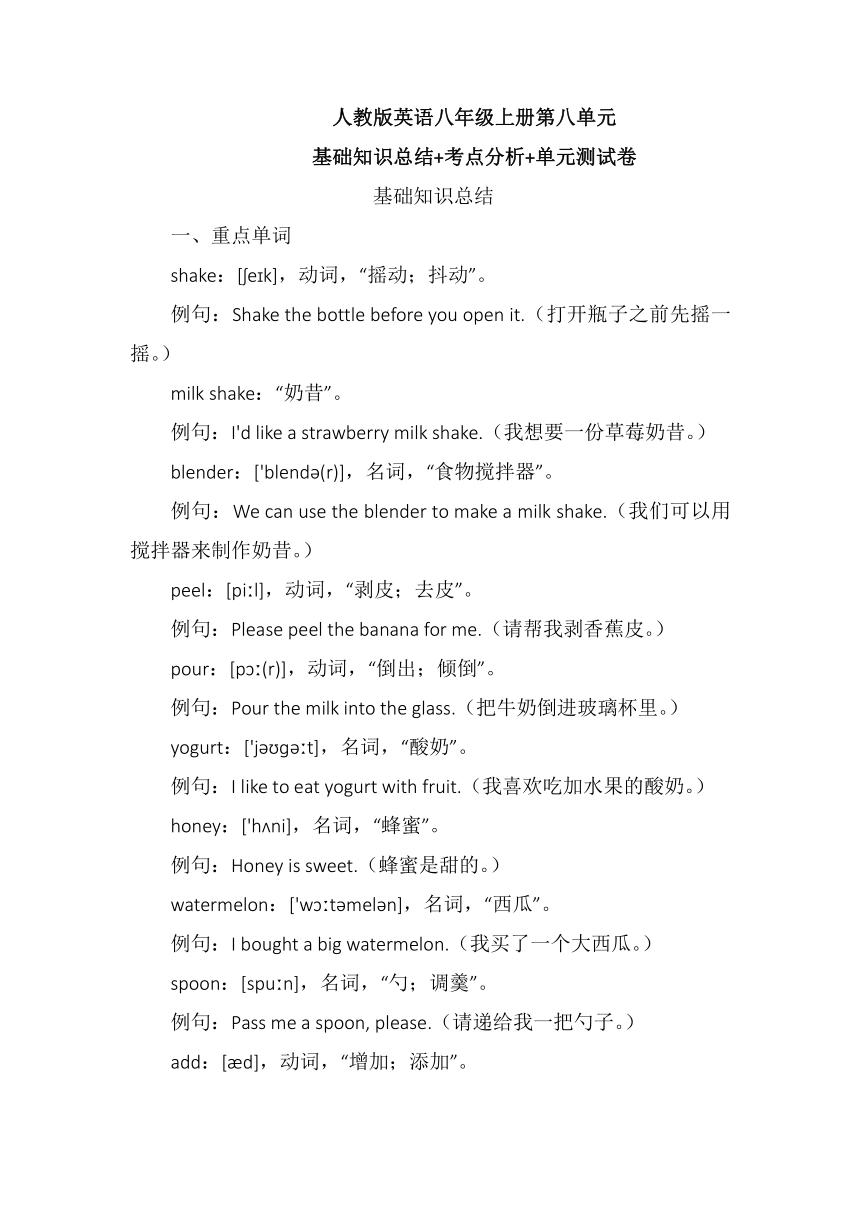
人教版英语八年级上册第八单元 基础知识总结+考点分析+单元测试卷 基础知识总结 一、重点单词 shake:[ e k],动词,“摇动;抖动”。 例句:Shake the bottle before you open it.(打开瓶子之前先摇一摇。) milk shake:“奶昔”。 例句:I'd like a strawberry milk shake.(我想要一份草莓奶昔。) blender:['blend (r)],名词,“食物搅拌器”。 例句:We can use the blender to make a milk shake.(我们可以用搅拌器来制作奶昔。) peel:[pi l],动词,“剥皮;去皮”。 例句:Please peel the banana for me.(请帮我剥香蕉皮。) pour:[p (r)],动词,“倒出;倾倒”。 例句:Pour the milk into the glass.(把牛奶倒进玻璃杯里。) yogurt:['j ɡ t],名词,“酸奶”。 例句:I like to eat yogurt with fruit.(我喜欢吃加水果的酸奶。) honey:['h ni],名词,“蜂蜜”。 例句:Honey is sweet.(蜂蜜是甜的。) watermelon:['w t mel n],名词,“西瓜”。 例句:I bought a big watermelon.(我买了一个大西瓜。) spoon:[spu n],名词,“勺;调羹”。 例句:Pass me a spoon, please.(请递给我一把勺子。) add:[ d],动词,“增加;添加”。 例句:You can add some sugar to the coffee.(你可以往咖啡里加些糖。) finally:['fa n li],副词,“最后;最终”。 例句:Finally, we finished the work.(最后,我们完成了工作。) salt:[s lt],名词,“食盐”。 例句:We need some salt to cook the dish.(我们需要一些盐来做菜。) sugar:[' ɡ (r)],名词,“食糖”。 例句:Don't eat too much sugar. It's bad for your health.(不要吃太多糖,对健康不好。) cheese:[t i z],名词,“干酪;奶酪”。 例句:I like cheese on my pizza.(我喜欢比萨上的奶酪。) popcorn:['p pk n],名词,“爆米花”。 例句:I like to eat popcorn while watching movies.(我喜欢在看电影时吃爆米花。) corn:[k n],名词,“玉米;谷物”。 例句:We grow corn in the field.(我们在田里种玉米。) machine:[m ' i n],名词,“机器;机械装置”。 例句:This machine is very useful.(这台机器非常有用。) dig:[d ɡ],动词,“掘(地);凿(洞);挖(土)”。 例句:They are digging a hole in the ground.(他们正在地上挖一个洞。) hole:[h l],名词,“洞;孔;坑”。 例句:There is a hole in the wall.(墙上有一个洞。) sandwich:['s nw t ],名词,“三明治”。 例句:I had a sandwich for lunch.(我午餐吃了一个三明治。) butter:['b t (r)],名词,“黄油;奶油”。 例句:Spread some butter on the bread.(在面包上涂一些黄油。) turkey:['t ki],名词,“火鸡”。 例句:We usually eat turkey on Thanksgiving Day.(我们通常在感恩节吃火鸡。) lettuce:['let s],名词,“莴苣;生菜”。 例句:I like to eat lettuce in a salad.(我喜欢在沙拉里吃生菜。) piece:[pi s],名词,“片;块;段”。 例句:Cut the cake into pieces.(把蛋糕切成块。) traditional:[tr 'd nl],形容词,“传统的;惯例的”。 例句:Spring Festival is a traditional festival in China.(春节是中国的一个传统节日。) traveler:['tr v l (r)],名词,“旅行者;旅客”。 例句:Many travelers come to this city every year.(每年有许多旅行者来到这个城市。) England:[' ɡl nd],名词,“英格兰”。 例句:London is the capital of England.(伦敦是英格兰的首都。) celebrate:['sel bre t],动词,“庆祝;庆贺”。 例句:We celebrate New Year's Day ... ...
~~ 您好,已阅读到文档的结尾了 ~~